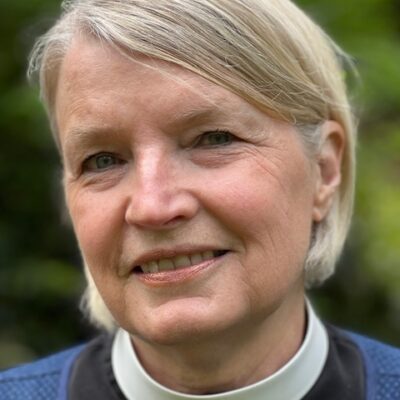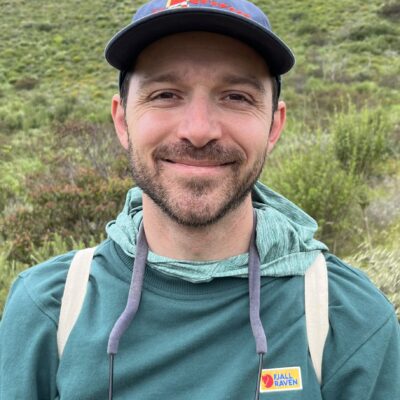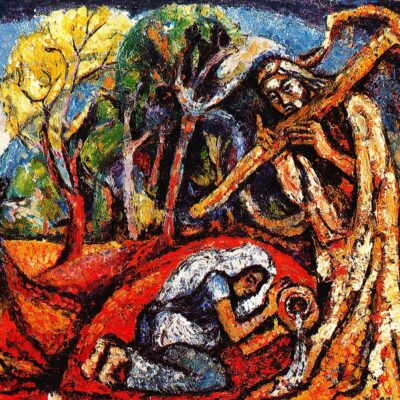There is a long tradition of mysticism in Christianity. It is a river that runs deep through the centuries and has been practiced by men, women and children from every time period, background and outlook. It includes famous mystics like St. John of the Cross, Julian of Norwich, the person who wrote “The Cloud of Unknowing,” and thousands of everyday folks who have had direct experience of the divine.
Mysticism is not just present in Christianity. It can be located in the rivers of Judaism, Islam, Buddhism and Hinduism. These are great rivers of tradition, practice and devotion. They each have their own separate identity and yet, the stream, the life-giving water that flows in each one mingles and recombines with others as river water evaporates into steam and cloud and then descends once again as snow, rain and hail.
In Judaism, one Rabbi who is fascinated by this strand in his faith is Lawrence Kushner. He defines a mystic in this way: “A mystic is anyone who has the gnawing suspicion that the apparent discord, brokenness, contradictions, and discontinuities that assault us every day might conceal a hidden unity.” That hidden unity is revealed as we understand ourselves ever more deeply to be located within God, part of the divine, in contact with a reality much larger than we are normally aware of.
I am not a mystic. I don’t do well with silent meditation. I’m happiest when actively “doing” something and less comfortable simply being. I’m more of a “Martha” than a “Mary,” paying attention to the practicalities, making sure the tasks are done. I’ve never had dramatic visions, heard the voice of the Almighty or been pulled out of this dimension into some higher, purer, spiritual plane. I’m an Episcopalian in part because Anglicanism is known to be a pragmatic, realistic sort of denomination, not prone to extremes (generally :).
For that reason, preaching on texts where there is direct, mystical encounter with the holy are very intimidating to me. The last time I preached was on the Feast of the Transfiguration, when Jesus goes up the mountain and is changed temporarily into glory. Today we’ve got another mountain top, but it’s Moses and the burning bush. These are overwhelming experiences. People and plants are transformed. The voice of God speaks. The very ground becomes holy and the people involved take off their shoes, they fall on their faces, they tremble. Nothing will ever be the same.
Sometimes we long for such a clear and unequivocal communication of the divine presence. We may even ask or demand God to show up, to answer us, to fix the desperate situation we face. We may try to earn or trick God into a manifestation through extreme fasting, long prayers or particular methods that have seemed to unlock mystical experience for someone else. We need direction, healing, proof that God is real and cares for us. We want answers to the question of why we suffer, why the world is in such bad shape and why God doesn’t intervene. Or maybe we were once touched by God directly and we wish for a repetition of that amazing event.
Yesterday I went looking for encounter. For me, that mostly means paying attention when I’m walking. Did I mention that I suck at meditation? My top silent prayer record is less than 15 minutes. It’s a good thing I have a spiritual director who contributed a chapter to the book, Spiritual Direction for the Extrovert! She’s the one who gave me permission to pray while walking. It seems to work for me.
There are some practices that set me up for a holy encounter while walking. When I walk while reflecting on Scripture it seems to help open my mind to a different kind of understanding. When I intentionally offer to God the people and problems I am concerned about, there is an attentiveness that seems reciprocated. All those everyday things that help nurture my relationship with God, like worship, prayer, holy learning, service to others, sharing the good news, confession and Sabbath rest provide support so that my eyes and ears can be open to receive God’s presence.
So I went walking in the Washington Arboretum. I was looking for azaleas in bloom, or at least cherry trees and some camellias. I was in search of fresh, green things and a good place for my dog, Sally, to stretch her legs. It turns out that it’s too early in the season and Azalea Way was still mostly bare twigs. It also turns out that our recent snowpocalypse punished the trees and shrubs in the arboretum. Everywhere there were downed limbs and broken branches. I had no difficulty observing the brokenness and damage of our world.
My head drooped as I surveyed the destruction and it bowed further as I thought about the crises I see on our streets every day from homelessness, drug addiction and mental illness. My heart was weighed down by the anger and disgust some people express towards those who are suffering in these situations and to those who are trying to help. I wondered how we could keep going here at St. Luke’s and in the Edible Hope Kitchen, caring for those on the margins, working to foster Beloved Community, seeking to love God and all our neighbors. How will we ever be able to develop our property in a way that fosters these values we hold so dear? My walk was getting heavy and I was no longer looking around me.
This is when it’s good to have a very active, three-year-old black lab. She chased up a side path around the corner and I followed. As I rounded the bend, there was a 40-foot-high old magnolia. At the very top of the tree canopy were enormous purple/pink blooms, just being touched by the sun. I remember coming to the garden later in the season in previous years and seeing the remains of these blooms and being sad that I had missed the full flowering. But now, I was here! I was in this place at the right time. This great tree had put forth all its energy one more time into gorgeous flower. It was old and damaged and it was glorious.
I didn’t hear a voice. I wasn’t transported to another dimension. But the words of Scripture suddenly echoed in my brain. “I am.” “I am” is here. “I am” is with you. The God of Abraham, Isaac and Jacob; the God of Jesus, Peter, Mary of Magdala and Martha; the God of all those who have gone before me is here. It’s the same message that Moses and Jesus heard.
It’s the same message for us. I have heard the cries of my people who are suffering. You are called to respond to them. I will be with you. With God all things are possible. I have the cattle on a thousand hills. I will be at your right hand. I will walk with you through desert, fire and flood. I will bring you and all my people safely home.
The holy one, blessed be God forever, is still active and present in our generation. Circumstances and situations may have changed but the vision is still the same. God has called us all to feast at the great banquet where everyone is welcome. God feeds us in body and soul so that we might feed others.
In just a few minutes, the spiritual pilgrims and companions for this year will be coming forward for the Rite of Welcome. Together we are walking this path, the Way of Love. We are called to “Turn, Learn, Pray, Worship, Bless, Go and Rest.” This Rule of Life opens our ears and eyes and heart to experience God’s presence. As we welcome them, each pilgrim will be signed with the cross to recognize that every part of them is engaged in a holy journey. It’s not that the heavens will open up and the Spirit will descend like a dove, (although anything is possible and this is St. Luke’s, Ballard after all!) It’s more likely that they will have fresh eyes and ears to see and hear God in their daily lives.
The gardeners had been active in the Arboretum. They didn’t immediately uproot the damaged plants. Instead, they had been tending them, propping up sagging limbs, clearing out dead branches, adding nutrients. Gardeners have eyes to see life where it looks like death. They remember the fruit and flower even in the dead of winter or the damage of natural disaster. They have hope for the following year.
This Lent, let’s let our good gardener loosen our hardened soil, pour into our parched soul the nutrients we need to flourish and feed us with the nourishment that will strengthen us to bear good fruit. Amen.





